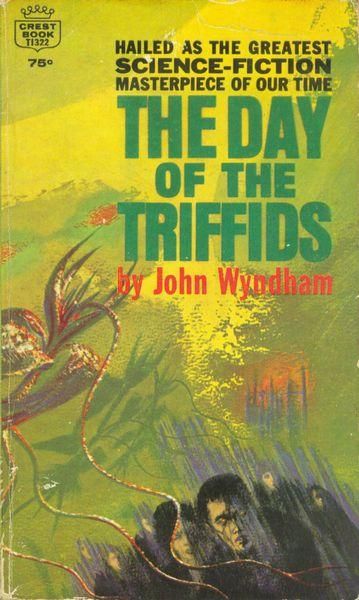English Country Garden
The Day of the Triffids
By John Wyndham

6 Jan, 2019
Although 1951’s The Day of the Triffids was not John Wyndham Parkes Lucas Beynon Harris’ first novel, it was the first that he published under the name John Wyndham. It established him as the master of the Cozy Catastrophe.
His eyes bandaged thanks to an injury, Bill Masen cannot see the wondrous meteor shower that lights up Earth’s sky. As a consequence, he is spared the side-effect that manifests the following day: total blindness. As most of the human population had ooh’d and ah’d at the sight, most of them are blind.
It gets worse.
Having hesitantly removed his bandages, Masen tours the hospital. It is full of the panicked blind. Matters outside the hospital, in crowded London, are even more chaotic. Some of the newly blind turn to drink. Some kill themselves when it becomes clear that there will be no organized help.
Here and there are a lucky few who missed the shower. Novelist Josella Playton is one such. Josella has been captured by a blind man who demands that she serve as his eyes. Masen meets and rescues Josella; they form a partnership of sighted survivors.
They must decide whether to stay in London and help the blind or flee to some rural refuge where they can begin rebuilding civilization. Staying in London may be pointless. When the food in the shops is all gone, all will starve. But still …
Then the blind start to die of a strange new disease. And the triffids break out of their pens.
Triffids are mobile carnivorous plants, armed with lethal stings; they were cultivated for vegetable oil. The sighted can escape them; the blind are easy victims. Once free, the triffids feast.
The only sensible thing to do is flee.
~oOo~
The author is sure that it’s better to be dead than blind. At least in the circumstances described. As Masen, the protagonist and narrator muses:
“You’ve got to grow a hide,” I told myself. “Got to. Its either that or stay permanently drunk. Things like that must be happening all around. They’ll go on happening. You can’t help it. Suppose you’d given them food to keep them alive for another few days? What after that? You’ve got to learn to take it, and come to terms with it. There’s nothing else but the alcoholic funk hole. If you don’t fight to live your own life in spite of it, there won’t be any survival… Only those who can make their minds tough enough to stick it are going to get through…”
Just one more example of the sort of hard-hearted realism preached by politicians, businessmen1, and too damn many SF authors. I could name novel after novel in which the protagonists do the hard thing and are lauded for it. I’ll just name one: Lucifer’s Hammer.
The Day of the Triffids is comparatively timid in scope (unlike Hammer, which revels in world-wide devastation). The narrator, Masen, is only vaguely aware there’s a world outside his comfortable middle-class British world. There are no speaking characters who are not English or at least British2.
I termed this a cozy catastrophe, but in some ways, it’s not. Through Masen’s eyes, we see children killed by triffids, people killing themselves, legions of the desperate blind staggering through the streets, sympathetic characters dying horrible deaths from the new plague. If Masen were prone to PTSD, he might not have survived.
It’s cozy because Masen doesn’t need to do anything to clear his path of the inconvenient blind. The non-suicidal fall ill and die or are stalked and killed by the triffids. This leaves the rest of the country to Masen and his companions; they didn’t even have to commit genocide to get their lebensraum3.
The Day of the Triffids is available here (Amazon) and here (Chapters-Indigo).
1: “If they would rather die,” said Scrooge, “they had better do it, and decrease the surplus population.”
2: Some minor characters expect the Americans to swan in and save the day. Needless to say, the US (along with the rest of the world) has problems of its own and has no resources to spare for a far off island.
3: Well, there’s one confrontation between Masen and some very annoying people, but they started it.
